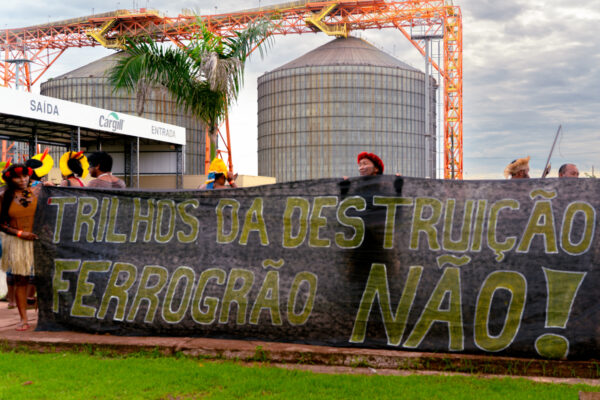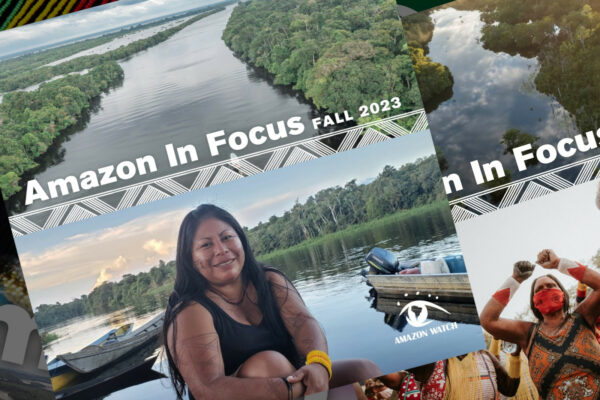We are living in a world where human rights and environmental issues are becoming more visible in our daily lives. Industry and governments have caught on to this and we are now seeing massive public relations campaigns costing hundreds of thousands of dollars, promising to invest millions into clean energy, human rights and corporate social responsibility programs. But are they just promises made to ease our minds and consciences as we scramble to live and work in the age of Big Oil – or do they signify substantial commitment to social and environmental change?
Talisman is one of many companies whose track record calls into question its stated commitment to social justice. Their investment in Sudan in 1998 lasted until 2003 when they pulled out of the war-torn country after the government was accused of using oil revenue to fuel the civil war. This situation left a large black mark on Talisman’s record as corporate citizens. Now, the company claims to be working hard to change this reputation.
A recent example suggests little has changed. In 2006, Talisman took over 1.6 million hectors of Peruvian land for development from Occidental Petroleum in 2006—known as blocks 64 and 101—areas inhabited by the Achuan people. After more than 30 years of oil and gas exploration and development by Occidental Petroleum, this area is a cesspool of toxins that have damaged the health and livelihood of the Achuan people. Occidental dumped an average of 850,000 barrels per day of toxic oil by-products directly into rivers and streams used by the Achuar for drinking, bathing, washing, and fishing.
Human rights group Amazon Watch says Occidental has caused rampant environmental and health problems in the area and cites a long list of harms. They claim that agricultural crops and livestock have been poisoned, half of local children have high levels of lead in their blood, unexplained diseases and other ailments plague residents and many believe many premature deaths have been caused by the pollution.
The organization states that because the area lies within pristine Amazon rain forest, unregulated development has caused rapid deforestation, destruction of species, and contamination of water in a sensitive environmental zone.
In May, I attended a meeting in Calgary between human rights and environmental representatives, including three Achuar elders, a human rights lawyer from Peru, and representatives from the American human rights and environmental organization Amazon Watch. This meeting coincided with the annual general meeting (AGM) of Calgary’s Talisman Energy. The group hoped to attend the AGM and have a private meeting with the president and other officials of Talisman. The goal: to ask Talisman not to go forward with their development plans for the area.
Remarkably, the Peru delegation met with Talisman CEO John Manzoni, as they had hoped, and were also able to attend the AGM. The delegation was pleased with the meeting with Talisman’s top brass. They walked away with a written commitment stating that, “(Talisman) will not work in Peru in areas in which it does not have an agreement with the community. We consider an agreement allowing Talisman to work would require a General Assembly with a positive vote of no less than two thirds of all the members of the community.”
Since returning to Peru, the delegation has met with the general assembly of community representatives, which have since drafted and ratified a document confirming their commitment to removing Talisman from the area. The document states:
“We say once more that we don’t accept that the company Talisman continues its oil operations in our territory and we ask that the company Talisman honor and comply with its decision to not enter our territory without the authorization of our people.”
So the community has spoken. They do not want Talisman developing their communities, right?
Not quite. According to Talisman, it has received the approval of the community it needs to continue its actions. Not once, but twice, in fact.
Let me explain: According to Talisman, Peruvian law requires two-thirds support of a general assembly (that means two-thirds of individuals in the affected area) must approve development. Since Talisman took over from Occidental Petroleum, they also inherited Occidental’s two-thirds general assembly support they had supposedly accumulated over the 30 years of development.
But that was not good enough for Talisman. They wanted to show the Peruvian government and the world what a good, honest and transparent corporate citizen they are. This summer they sent out employees into villages throughout the Amazon to collect the votes they needed, before submitting the results to government who gladly approved their application for development.
The obvious question: How can a corporation, which will benefit enormously from the development of land, be allowed to collect the votes it needs to continue its activities? Where are the checks and balances? Who is overseeing the collection of votes?
The government has given Talisman the green light and therefore put their citizens and their environment in the back seat to corporate profit. Just as it did with Occidental for over 30 years, the government of Peru has again prioritized the interests of industry over the public good.
Evidently, Talisman has not changed since Sudan. Their public relations might be a bit more savvy and polished, but nothing has changed. Again, they are exploring and working within a country that has prioritized profit over the health of the environment and its citizens.













